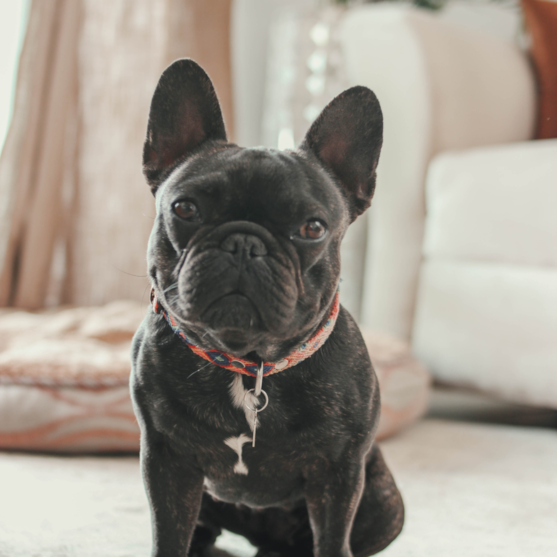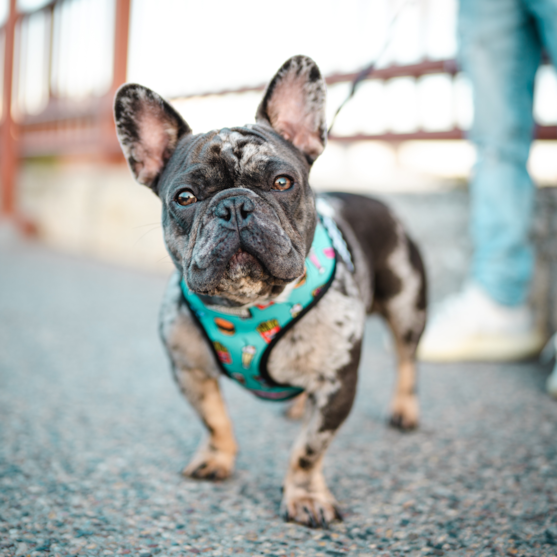French Bulldog Breed Information


The French Bulldog is a small, sturdy companion dog with a big personality and a look that’s hard to miss. With their signature bat ears, short snouts, and expressive eyes, Frenchies have a one-of-a-kind charm that continues to win hearts around the world. Originally developed as a companion for lace workers in 19th-century France, they’ve come a long way—from factory floors to becoming one of the most popular breeds in the world.
Despite their compact size, French Bulldogs are full of life. They thrive on human connection and enjoy being part of whatever their people are doing. Whether curled up on the couch or tagging along for a short walk, they stay close, affectionate, and alert to everything going on around them.
Frenchies are known for their adaptability. They settle easily into apartments, suburban homes, or busy city life. They don’t need much space or exercise to stay content, but they do need attention. These dogs form deep bonds and often follow their people from room to room—happy just to be included. With their playful spirit, relaxed energy, and easygoing nature, French Bulldogs bring comfort, fun, and a steady presence to any home.
Characteristics
- Affectionate and people-focused – French Bulldogs form strong bonds with their families and enjoy staying close. They prefer to be near their people and do best when included in daily life.
- Playful but laid-back – They enjoy short bursts of energy but don’t need constant activity. After a little play, they’re usually ready to relax by your side.
- Compact and sturdy – Despite their small size, Frenchies have a muscular, well-built frame. Their body is solid and balanced, giving them a confident, grounded presence.
- Low-maintenance grooming – Their short, smooth coat requires minimal upkeep, though regular cleaning of skin folds helps keep them healthy.
- Alert and aware – They’re naturally observant and often act as little watchdogs. While they may bark at a sound or visitor, they’re not known for excessive noise.
- Adaptable in different environments – French Bulldogs settle into apartments, homes, or busy city life with ease, as long as they stay cool and have companionship.
- Sensitive to heat – Their flat faces make it harder to regulate body temperature, so they do best in cool environments with access to shade and water.
- Gets along with others – They typically do well with children and other pets, especially when socialized early and handled with care.
- Strong-willed but cooperative – They have an independent streak but enjoy learning when training stays positive and low-pressure.

Appearance
The French Bulldog has a distinctive and instantly recognizable look. Its compact body, large bat-like ears, and flat, square-shaped head give it a unique silhouette that stands out in any crowd. Everything about the breed’s build reflects a balance of sturdiness, charm, and character.
French Bulldogs are a small breed, usually weighing between 16 and 28 pounds and standing around 11 to 13 inches tall at the shoulder. Their frame is stocky and muscular, with a broad chest, short legs, and a short, low-set tail that may be straight or slightly corkscrewed. Though small in stature, Frenchies are dense and solid, often surprising people with their weight.
One of the breed’s most iconic features is the head. The skull is large and square with a short, broad muzzle and a slightly wrinkled forehead. The face carries a soft, curious expression, thanks to their round, dark eyes and upright, wide-set ears that resemble open tulip petals. These “bat ears” are a signature trait of the French Bulldog and are always naturally erect—no cropping or training required.
The coat is short, smooth, and fine. It lies close to the body and has a natural shine when healthy. Frenchies come in a wide range of colors, including fawn, cream, white, and brindle, as well as pied patterns that combine white with spots of other colors. Rare but recognized variations include blue, lilac, and chocolate, though these often fall outside traditional breed standards and may come with added health risks.
Their skin is loose and soft, especially around the head and shoulders, which can create charming facial folds. These folds require occasional cleaning to keep the skin dry and free from irritation.
French Bulldogs carry themselves with confidence and a light, even gait. They’re compact without being fragile and show a sense of balance in their movement, even though they’re not built for speed or agility.
Temperament
The French Bulldog is known for its affectionate, easygoing nature and thrives in homes where companionship is a central part of daily life. These dogs form close bonds with their people and enjoy being involved in everything from a casual stroll to a cozy evening on the couch. They stay close, often following their owners from room to room, always eager to be part of the moment.
Frenchies are friendly by nature. They tend to greet strangers with curiosity and warmth, especially when properly socialized as puppies. They enjoy meeting new people, do well with children, and usually adjust easily to households with other pets. Their social, outgoing personality makes them a natural fit for both quiet homes and more active ones.
While they love attention, French Bulldogs are not overly demanding. They’re happy with short bursts of play, light activity, and a regular presence of their people. Their temperament stays steady—calm, affectionate, and always a little playful. They don’t need constant stimulation, but they do need closeness.
This breed is also known for its sense of humor. Frenchies often display quirky behaviors and funny expressions that keep their families entertained. Whether they’re “talking” in soft grumbles, doing a quick zoom around the living room, or curling up in an unexpected spot, they add charm and personality to the household.
Despite their playful side, they can be a little stubborn. French Bulldogs like to do things on their terms and sometimes resist commands if the motivation isn’t clear. They respond best to positive reinforcement and a calm, consistent approach. They don’t do well with harsh correction or pressure, but they do love praise and a little food incentive.
Frenchies are also emotionally sensitive. They pick up on the tone and energy of the home and tend to stay in sync with the people around them. If the household is calm, they’re calm. If there’s excitement in the air, they’ll jump in with enthusiasm. This emotional awareness makes them not just pets—but true companions.
Care
Grooming
The French Bulldog has a short, fine coat that’s relatively easy to care for, but grooming goes beyond brushing alone. Regular maintenance helps keep their skin healthy, reduces shedding, and supports overall comfort—especially around the face and ears, where Frenchies need a little extra attention.
Their smooth coat benefits from a quick brush once or twice a week. A soft-bristle brush or grooming mitt helps remove loose hair, distribute natural oils, and keep the coat looking clean and shiny. Although they shed moderately, weekly brushing keeps the hair under control and reduces what ends up on furniture and clothes.
Baths aren’t needed often—usually every month or so unless they get into something messy. Gentle dog shampoo works best, especially on dogs with sensitive skin. After bathing, it’s important to dry their skin folds and creases completely to prevent moisture buildup, which can lead to irritation.
Facial folds are a signature feature of the breed, especially around the nose and under the eyes. These areas should be wiped gently with a soft cloth or vet-approved wipes a few times a week. Keeping the folds dry and clean helps prevent odor, redness, and bacterial infections.
Their ears need consistent care as well. French Bulldogs have large, open ears that can collect dust and debris. Weekly cleaning with a cotton pad and a dog-safe ear solution helps keep them clear and reduces the risk of infection. Avoid using cotton swabs inside the ear canal, and look for signs of irritation like redness or odor.
Nail care is another important part of the routine. Their nails grow quickly and should be trimmed every two to three weeks to prevent discomfort or posture issues. Many French Bulldogs don’t enjoy nail trimming, so starting early and keeping the experience calm helps them adjust.
Dental hygiene also matters. Frenchies can be prone to tartar buildup, so brushing their teeth several times a week—or using dental chews and vet-recommended rinses—supports fresher breath and long-term health.
Exercise Needs
The French Bulldog has a moderate energy level and doesn’t need intense workouts to stay happy. A balanced mix of short walks, light play, and mental stimulation keeps them fit, engaged, and well-behaved. While they enjoy bursts of activity, they’re just as content lounging at your side once their needs are met.
Most Frenchies do well with 20 to 40 minutes of exercise per day, broken up into smaller sessions. A casual walk around the block, some time in the yard, or an indoor game of fetch helps burn energy without pushing their physical limits. They aren’t built for endurance, but they enjoy staying active in short, steady doses.
Play is an important part of their routine. French Bulldogs love interactive toys, tug-of-war, and simple games that include their people. They’re natural clowns and often turn everyday activities into entertainment with their silly antics and animated expressions.
Because of their brachycephalic (flat-faced) anatomy, Frenchies are sensitive to heat and humidity. Exercise should always be adjusted based on the weather. On warm days, they do best indoors or during cooler parts of the day—like early morning or late evening. Shade, fresh water, and air-conditioned spaces help them cool down quickly if they start to overheat.
Mental stimulation goes hand-in-hand with physical activity. Puzzle feeders, short training sessions, or exploring new environments can keep a Frenchie mentally sharp. Boredom may lead to chewing, barking, or clingy behavior, so variety helps maintain balance.
Although they enjoy socializing, Frenchies don’t always do well at busy dog parks or in rough play with larger breeds. They prefer calm, controlled settings where they can play safely and stay relaxed.
With the right balance of movement and downtime, French Bulldogs remain calm, friendly, and well-adjusted. They don’t need a high-energy lifestyle—but they do need regular attention, gentle activity, and time to stay close to their people.
Health
The French Bulldog is generally a healthy, resilient companion, but it does come with a few breed-specific health considerations that owners should keep in mind. Most Frenchies live long, happy lives when given regular care, close attention, and a comfortable environment—but awareness makes a difference.
One of the most well-known concerns is their brachycephalic anatomy. The flat face and short nose can lead to breathing difficulties, especially in hot or humid weather. These dogs are prone to brachycephalic obstructive airway syndrome (BOAS), a condition that affects airflow and may cause snoring, heavy panting, or labored breathing. While many French Bulldogs have mild symptoms, some may require lifestyle adjustments—or in more serious cases, surgical intervention.
Heat sensitivity goes hand in hand with their facial structure. French Bulldogs don’t regulate their body temperature efficiently and can overheat quickly. Keeping them cool, avoiding strenuous activity in warm conditions, and providing access to shade and water are all essential.
Skin and coat health is another focus. Their facial folds and underarm areas need regular cleaning to prevent irritation and bacterial buildup. Some Frenchies are prone to allergies or food sensitivities, which may show up as itching, ear infections, or digestive issues. These symptoms can usually be managed with a vet-guided diet or medicated skincare routine.
Joint and spine health also deserves attention. French Bulldogs have a compact, muscular build, but their short legs and broad body can put pressure on the spine. Conditions like intervertebral disc disease (IVDD) may appear, especially in dogs that jump frequently or are overweight. Keeping their weight in check and minimizing impact from jumping helps support long-term mobility.
Dental care plays a role as well. Their crowded jaw structure makes them more prone to tartar buildup and gum issues. Regular brushing, dental chews, and vet cleanings support good oral hygiene and reduce long-term risks.
Lifespan
The French Bulldog typically lives between 10 and 12 years, though many enjoy longer lives with proper care and a stable, well-balanced lifestyle. Their longevity depends on a mix of genetics, daily habits, and preventive health measures that support both physical comfort and emotional well-being.
While the breed isn’t known for an exceptionally long lifespan, its steady nature and manageable size contribute to overall durability. Frenchies aren’t overly fragile, but they do need a lifestyle that fits their structure—especially when it comes to weight management, breathing comfort, and activity levels.
A healthy diet plays a key role. Measured portions, quality ingredients, and regular mealtimes help maintain a lean body and support heart, joint, and digestive health over time. Excess weight can shorten a French Bulldog’s lifespan, especially when combined with limited breathing efficiency.
As they move into their senior years, French Bulldogs tend to slow down naturally. They may nap more, show less interest in active play, or need extra support in extreme weather. Short walks, orthopedic bedding, and routine vet visits help manage these changes and keep older Frenchies comfortable and involved.
Dental care, ear cleaning, and monitoring for skin issues remain important throughout their life. Small adjustments—like gentle daily grooming, cooler walking times, or supplements for joint support—can extend quality of life and help ease the signs of aging.
Emotionally, French Bulldogs stay affectionate and loyal well into their later years. They don’t lose their bond with their family, and they continue to enjoy close connection, quiet routines, and familiar spaces. With consistent attention and a calm, caring home, they age with dignity and grace.
Training
The French Bulldog is smart, responsive, and eager to please—but also a little stubborn. This breed has a strong personality and likes to do things at its own pace. While they learn quickly, they sometimes push limits or ignore commands when the mood strikes. With calm consistency and a bit of patience, Frenchies become well-mannered, responsive companions.
Training works best when it feels like a game, not a chore. French Bulldogs respond well to positive reinforcement—gentle praise, treats, and short bursts of fun. They lose interest when sessions drag on, so it’s best to keep training quick and upbeat. A few five-minute sessions a day often get better results than one long one.
House training may take a little time, especially with puppies. A regular routine and frequent outdoor breaks help build reliable habits. Many Frenchies benefit from crate training, which gives them a cozy, safe space and helps reinforce bathroom timing.
While French Bulldogs aren’t known for excelling in obedience competitions, they enjoy basic training and benefit from learning simple commands like sit, stay, come, and leave it. These skills help them stay focused, build confidence, and make everyday life smoother—especially in public or around other dogs.
Socialization is just as important as obedience. Exposing a Frenchie to new people, sounds, animals, and environments while they’re young helps prevent fear-based behavior and supports a balanced temperament as they grow. French Bulldogs are naturally sociable, but they still benefit from early, gentle exposure to the world around them.
Leash training is also part of the routine. French Bulldogs are compact and strong, and while they aren’t likely to pull constantly, they can be headstrong. Using a harness instead of a collar gives you better control without putting pressure on the neck, which is important for a brachycephalic breed.
Training a Frenchie takes a light touch, clear boundaries, and a good sense of humor. They may test your patience now and then, but they’re eager to engage and thrive when they understand what’s expected.
History
The French Bulldog has a rich and well-traveled history that begins in England, not France. In the early 1800s, lace workers in Nottingham developed a smaller version of the English Bulldog—compact, friendly, and easier to keep in close quarters. When the lace industry began to decline, many workers relocated to France, bringing their little bulldogs with them.
In France, the breed quickly gained popularity. Locals appreciated its small size, bat-like ears, and affectionate nature. Over time, French breeders refined the look, selecting for upright ears and a more compact frame. These little dogs became favorites in working-class neighborhoods and quickly caught the attention of artists, writers, and society figures across Paris.
By the late 19th century, the French Bulldog had become a staple of Parisian life—seen in cafés, marketplaces, and the homes of fashionable city dwellers. The breed’s quirky charm and relaxed attitude fit perfectly with the city’s culture. Soon, the dog made its way back across the English Channel and over to America, where it gained a following among well-known families and socialites.
The American Kennel Club (AKC) officially recognized the French Bulldog in 1898, shortly after the breed made a splash at the Westminster Dog Show. Over the decades, its popularity rose steadily, with occasional dips tied to concerns about breeding standards and health. However, careful breeding and growing awareness of the breed’s needs have helped maintain its steady appeal.
In recent years, the French Bulldog has exploded in popularity. It has consistently ranked among the top five dog breeds in the United States, and in 2022, it officially became the most popular breed in the country, surpassing the Labrador Retriever’s long-standing reign. Its combination of charm, size, and low-maintenance personality continues to draw attention worldwide.
Despite its name, the French Bulldog has roots in multiple countries and cultures. Its journey from English workshops to Parisian cafés to global popularity is a reflection of its universal appeal—a small dog with a big heart, a bold look, and a timeless personality.
